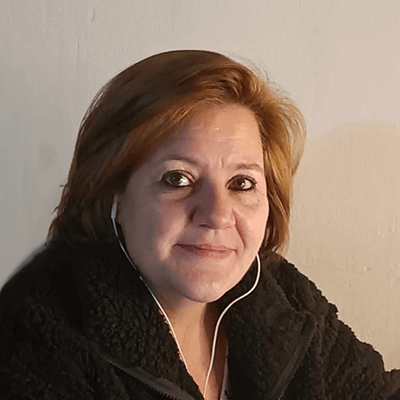Following a successful career in the advertising industry, Natasha explored her passions for language and teaching. She has now been teaching for over 12 years, having worked with students in South Africa, China, and South America. She believes teaching is her calling, not a job, and for students, learning should be fun, not a chore. To that end, her classes are student-centered with engaging activities and authentic resources that inspire lifelong learning.
What is your professional and educational background?
As a young girl, I loved helping my Dad, who was a photolithographer, in the darkroom. Later, I followed in his footsteps but with a lot more technology at my disposal! I studied and trained to work in desktop publishing (DTP) and graphic design. For years, I worked in the advertising industry and loved the challenge of being a production manager.
In my early thirties, I decided to take a break from the rat race and explore the Orient. I got my TEFL certification and left for China. Wow! What an experience. One year turned into ten and teaching became my new passion. I would love to say I learned to speak Chinese as well as Afrikaans but sadly, that wasn’t the case. Teaching changed my life and taught me how to reach out to others and help students achieve their dreams.
How long have you been teaching languages and what inspired you to become a teacher?
I love words and I love teaching. I have always had a passion for vocabulary and using it to help others gives me the best of both worlds. You’ll always find me with my nose in a book or doing crossword puzzles. Words make me happy but I also enjoy chatting with people. Combining the two led me to teaching. I have been teaching English for over 12 years. I have worked with students in South Africa, China, and South America. To me, teaching is not a job, it is a calling.
Which Bridge Certifications or Micro-credentials have you completed?
I have completed the Teaching Business English Specialized Certification.
What is your teaching philosophy or approach to helping students learn a new language?
I believe that students need to work in a relaxed and comfortable atmosphere. Learning should not be a chore, it should be fun. Listen to books or podcasts that you love. Watch movies or series that interest you. Read books that you find enjoyable. Learning should never bore you! The same applies in the classroom, classes should be engaging and allow the student the opportunity to freely express themselves.
What do you believe are the key skills and language areas that students should focus on when learning Business English?
Listen, listen, listen! This to me is the most important skill. How do we learn to speak as a child? We listen to those around us. We listen, learn, and finally speak. If those around us have bad speaking habits, we learn them too. Our brains are sponges and we pick up whatever is around us. In my mind, listening leads to speaking, and speaking leads to writing and reading. All four skills are important, but to me, the journey begins with listening.
What language do you speak?
English is my first language but South Africa has eleven official languages. At school, it is mandatory to learn Afrikaans which is widely spoken throughout South Africa as well as one of the African languages. Learning to speak a language from a young age is definitely much easier than learning as an adult. While living in China, I tried learning Chinese and it was a really difficult language to master! I have a special appreciation for any person who is brave enough to learn a language as an adult and use the language to communicate. If not for the brave people who are willing to do so, communication worldwide would be non-existent. Go language learners!
How do you adapt your teaching style to meet the needs of different students?
Each student should be treated and valued as an individual. Allowing students to use their own methods and individuality to learn and make the classroom their own is essential to success. Using body language and verbal cues is a good way to help tailor the class to a student’s specific needs. I believe in letting the student set the tone of the classroom in order to make the atmosphere a comfortable learning environment for learning.
Can you share any tips or advice for professionals looking to improve their business communication skills in English?
Firstly, work on your listening as much as possible. Secondly, be brave! Take the opportunity to express yourself even if your speaking is not perfect. Thirdly, believe in yourself. Sometimes we underestimate ourselves and place limits on what we can and cannot do. Don’t limit yourself! Reach for the stars.
